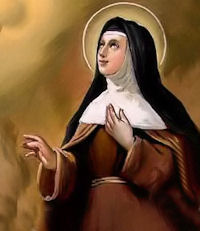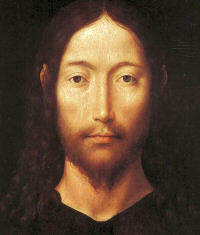Lent: March 6th
Thursday after Ash Wednesday
Other Commemorations: St. Colette, Virgin and Religious (RM)
» Enjoy our Liturgical Seasons series of e-books!
"If your virtue goes no deeper than that of the scribes and pharisees, you will never get into the kingdom of heaven (Matt. 5:20)." The need to make reparation is a vital, inescapable urge of a free person. His very nature cries out for order and peace. His reason tells him that where an order has been violated, the order must be repaired; and the higher the order, the greater must be the reparation. To be free at all, is to accept the responsibility for atonement. Sin is a violation of God's order. Sin demands reparation — the reparation of personal penance, personal prayer, personal charity to all. Part of our atonement to God is made by serving our fellow men. — Daily Missal of the Mystical Body
According to the 1962 Missal of St. John XXIII the Extraordinary Form of the Roman Rite, today is the feast of Sts. Perpetua and Felicitas. Their feast in the Ordinary Form of the Roman Rite is celebrated on March 7. Historically today is the feast of St. Colette, who revived the Franciscan spirit among the Poor Clares. Her reform spread throughout France, Savoy, Germany and Flanders, many convents being restored and seventeen new ones founded by her. She helped St. Vincent Ferrer in the work of healing the papal schism.
St. Colette
 Born in 1380, Nicolette was named in honor of St. Nicholas of Myra. Her loving parents nicknamed her Colette from the time she was a baby. Colette's father was a carpenter at an abbey in Picardy. Quiet and hard-working, Colette was a big help to her mother with the housework. Her parents noticed the child's liking for prayer and her sensitive, loving nature.
Born in 1380, Nicolette was named in honor of St. Nicholas of Myra. Her loving parents nicknamed her Colette from the time she was a baby. Colette's father was a carpenter at an abbey in Picardy. Quiet and hard-working, Colette was a big help to her mother with the housework. Her parents noticed the child's liking for prayer and her sensitive, loving nature.
When Colette was seventeen, both her parents died. The young woman was placed under the care of the abbot at the monastery where her father had worked. She asked for and received a hut built next to the abbey church. Colette lived there. She spent her time praying and sacrificing for Jesus' Church. More and more people found out about this holy young woman. They went to see her and asked her advice about important problems. They knew that she was wise because she lived close to God. She received everybody with gentle kindness. After each visit, she would pray that her visitors would find peace of soul. Colette was a member of the Third Order of St. Francis. She knew that the religious order of women who followed St. Francis' lifestyle are the Poor Clares. They are named after St. Clare, their foundress, who was a follower of St. Francis. During Colette's time, the Poor Clares needed to go back to the original purpose of their order. St. Francis of Assisi appeared to Colette and asked her to reform the Poor Clares. She must have been surprised and afraid of such a difficult task. But she trusted in God's grace. Colette traveled to the Poor Clare convents. She helped the nuns become more poor and prayerful.
The Poor Clares were inspired by St. Colette's life. She had a great devotion to Jesus in the Eucharist. She also spent time frequently meditating on the passion and death of Jesus. She loved Jesus and her religious vocation very much.
Colette knew exactly when and where she was going to die. She died in one of her convents in Ghent, Flanders, in 1447. She was sixty-seven. Colette was proclaimed a saint by Pope Pius VI in 1807.
—Excerpted from Holy Spirit Interactive
Symbols and Representation: birds; lamb; woman being carried to heaven by an angel; woman delivering a soul from purgatory; Poor Clare nun holding a crucifix and a hook; Poor Clare nun visited by Saint Anne, Saint Francis of Assisi, and/or Saint Clare of Assisi in a vision; Poor Clare nun walking on a stream
Patronage: against eye disorders; against fever; against headaches; against infertility; against the death of parents; craftsmen; Poor Clares; servants; Corbie, France; Ghent, Belgium
Highlights and Things to Do:
- Read more about St. Colette:
- The Colettines are a reformed branch of the Poor Clares. See the Ty Mam Duw Poor Clare Colettine Community for an example of one of the communities.
- St. Colette's relics are at Monastère Sainte-Claire in Poligny, France.






